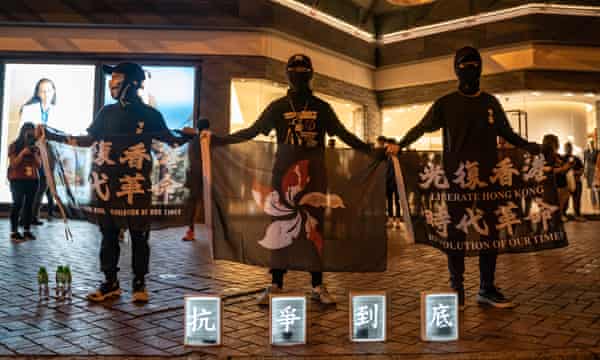05/22/20
Beijing’s parliament has announced that it will discuss controversial national security laws for Hong Kong in a dramatic escalation of China’s efforts to place the semi-autonomous territory under its control and curtail pro-democracy protests.

What are the national security laws?
Article 23 of Hong Kong’s mini-constitution, the Basic Law, says the city must enact national security laws to prohibit “treason, secession, sedition [and] subversion” against the Chinese government.
But the clause has never been implemented because of deeply held public fears that it would curtail Hong Kong’s cherished rights, such as freedom of expression. An attempt to enact article 23 in 2003 was shelved after half a million people took to the streets in protest.
Why are the laws back on the agenda?
The possibility that the shelved laws would be revived increased as the city descended into mass protests and crackdowns last year. During the past few months, while much of the world has been distracted by the coronavirus pandemic, Beijing appears to have hardened its position towards Hong Kong.
In April, Beijing’s top official in the territory, the head of China’s liaison office in Hong Kong, Luo Huining, called for Hong Kong urgently to pass the laws to combat radical violence, foreign interference and pro-independence forces.
Beijing’s offices in the territory have also declared that Basic Law articles barring Chinese departments from interference in Hong Kong do not apply to them.
The protests that racked the city last year dissipated during the pandemic, but now that Hong Kong is coming out of lockdown, they have restarted. The government is adamant that the protest movement must be stopped to save Hong Kong’s reputation, society and economy.
Beijing may also be looking ahead to Hong Kong’s elections for the legislative council in September. After months of protests, and a very successful run at district council elections last year, pro-democracy candidates could win a majority. They have vowed to block bills put forward by the government.
Why are they so controversial?
Hong Kong, which operates under the one-country, two-systems framework, has enjoyed liberties not available in mainland China such as an independent, free press and the ability to demonstrate. It has long been a safe haven for critics of the Chinese government. Such critics fear the laws will be used against anyone objecting to the central government or the Beijing-backed Hong Kong government.
They are especially worried that the law would apply to those who have been protesting during the past year, in some cases burning the Chinese flag or defacing the Chinese liaison office in Hong Kong. Chinese authorities have routinely described the protesters as “terrorists”.
“Given how Beijing conceptualises ‘national security’ as any act or speech that criticises the party, a law that protects national security is likely to mean an end to Hong Kong as we know it,” said Maya Wang, China researcher for Human Rights Watch. “Most importantly, we will lose a safe harbour for dissent on Chinese soil, at a time when the world needs a place that keeps speaking truth to an increasingly powerful China.”
Last month Martin Lee, a pro-democracy veteran, politician and barrister who helped draft the Basic Law, said Hong Kong was required to legislate the national security laws. However, he now objected to it because the governments had failed to fulfil their obligations to introduce universal suffrage in the territory.
What comes next?
The laws could technically be implemented by promulgation – essentially a decree – although analysts said this would be an unprecedented act of provocation. Instead they would probably first be sent through Hong Kong’s legislative council, in the same way that an (also controversial) national anthem law is heading towards its second reading.
Pro-democracy legislators strongly dispute the legality of Beijing imposing the laws. Protests against Beijing’s intervention were quickly called on Thursday. Whether they take off remains to be seen, but much of Hong Kong is deeply angry.
The Guardian
















 Hong Kong’s security laws: what are they and why are they so controversial?
Hong Kong’s security laws: what are they and why are they so controversial?







